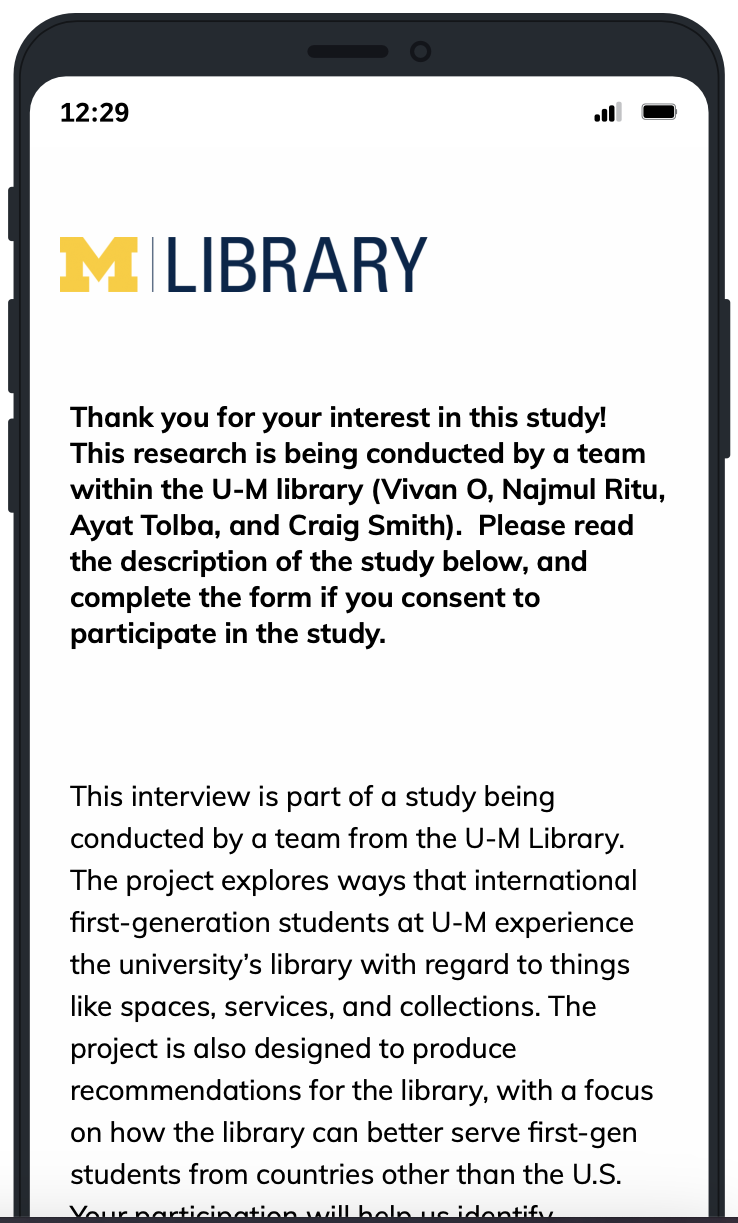About Me
My name is Ayat Tolba, and I am a senior majoring in Political Science with minors in UX Design and Middle Eastern & North African Studies. With my background in UX, I’ve been eager to explore how design and research can be leveraged to enhance inclusivity and accessibility. While navigating grad school applications and balancing extracurriculars, I came across the Michigan Library Scholars (MLS) research internship, and I was instantly drawn to the project focused on the experiences of first-generation international students. As the child of immigrants, I have witnessed firsthand what it feels like to navigate spaces that aren’t always built with people like us in mind: confusing, overwhelming, and sometimes isolating. This project felt like the perfect intersection of my skills and passions: an opportunity to grow as a researcher while contributing to work that surfaces stories like mine and fosters empathy in institutional spaces.
Project Overview
Our project built on a 2023 campus-wide survey conducted by the U-M Library, which gathered feedback from more than 15,000 students, faculty, and staff. We wanted to take those findings a step further by focusing on a specific and often overlooked group: first-generation international students. Our goal was to understand their experiences with the library, what their first visits felt like, how they navigated resources, and what changes they hoped to see. To do this, we designed our own study, conducted interviews, coded and analyzed the data, and created a final presentation with actionable recommendations for the library to better support this community.

The Process
When we first began this project, everything felt a bit overwhelming. We started by reviewing the survey results, examining both the questions that were asked and the feedback collected. We also explored other library studies and literature reviews to see how similar research had been conducted. This helped guide and motivate us as we developed our own approach.
From there, we created an interview question guide based on both the survey results and the areas we felt were most important to explore. The guide was divided into several parts:
- Physical spaces: How students felt physically in the library and whether they found the environment welcoming or comfortable.
- Social experiences: What drew students to the library, whether it was friends, a sense of community, or a need for connection.
- Library resources: How students accessed and interacted with library resources, both inside the building and through online services they relied on regularly.
Finally, one of the most meaningful parts of our interview guide focused on questions that acknowledged the current political climate. We felt it was important to create space for first-generation international students to share their experiences navigating challenges like discriminatory policies, unsafe social conditions, and the university’s failures, not only in supporting them as international students, but also in fostering a hostile, discriminatory environment for student protesters. Including these questions ensured that our research captured not only how these students used the library but also how broader social and political realities shaped their experiences on campus.
After finalizing our interview script, we began reaching out to students. Vivian, a fellow intern, created a stratified random sampling pool, allowing us to contact students who fit the demographic we were most interested in studying. From there, we conducted our outreach and scheduled interviews. My favorite part of the research was definitely having the opportunity to speak directly with students, hearing their stories firsthand, and then being part of the analysis process afterward. I assisted in coding the interview transcripts into themes using grounded theory techniques, which allowed us to identify patterns and gain deeper insights into their experiences.

Our team developed a comprehensive interview guide informed by our research questions.
Lessons Learned

We used Qualtrics to host our informed consent form and provide participants with a convenient way to sign up for interview slots.
Over the past few weeks, I had the opportunity not only to conduct research but also to gain skills I will carry with me for a lifetime. Since much of this project required working independently, one of the biggest skills I developed was time management, and learning how to balance tasks and meet deadlines effectively. I also took on the responsibility of coordinating our Qualtrics form and Calendly scheduling, which could only be managed by one team member. This taught me how to stay professional and organized, even under stressful situations.
One of the most valuable skills I gained was learning how to conduct interviews and analyze data afterward, which deepened both my research abilities and my confidence in qualitative methods. I am so thankful to the Michigan Library Scholars Program, my teammates Vivian and Najmul, and our mentor Craig for making this summer so impactful. Working with such a kind, encouraging, and collaborative team made this experience truly meaningful.